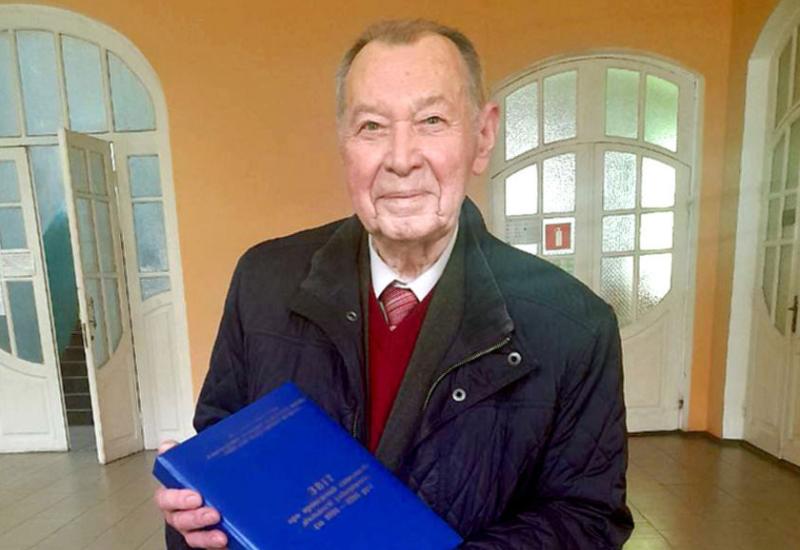On May 12, Volodymyr Ugolnikov, until recently the head of the accreditation sector of the educational and methodological department of Igor Sikorsky KPI, turned 90.
📰
He was born in Vyazma into the family of a Red Army cavalry commander. He graduated from the Kyiv Higher Engineering Radio Technical School of Air Defense. His military service was intense and demanding, including training specialists at the KVIRT Air Defense School and special missions to Vietnam and Afghanistan. He has the status of a combatant and has been awarded orders and medals of the USSR and foreign countries.
Volodymyr Yukhimovich was invited to work at KPI by the university administration. On March 1, 1997, he became deputy head of the educational and methodological department. With extensive experience in training military specialists, he actively participated in improving the quality of graduate training, focusing primarily on accreditation and licensing issues.
His tenure coincided with the transition of Ukrainian education, including higher education, to European criteria, standards, and technologies. In particular, in 1997, a new List of Specialties and Training Areas (2005-2010) was adopted, followed by the introduction of a credit-modular system of education, and in 2019, a new system of accreditation and licensing by the National Agency for Higher Education Quality Assurance. All this was associated with the development of new regulatory, methodological, and educational documents, including those related to accreditation and licensing. Such large-scale campaigns as the certification of the university for compliance with the requirements of the National Educational Institution of Ukraine (1999), the accreditation of all specialties and areas of training (2003), regular accreditation of all its specialties by the university (2013), and accreditation of specialties by the National Agency for Higher Education Quality Assurance (2019) also required considerable effort for their high-quality implementation. Volodymyr Yukhymovych was an active participant in all these processes, demonstrating a creative approach to the development of materials, personal responsibility, high professionalism, high standards, respect for the opinions of employees, and a desire to help or provide expert advice. Until 2019, most universities in Ukraine conducted accreditation of specialties based on his methodological developments.
Volodymyr Yukhymovych's employees and colleagues always note his intelligence, integrity, and exceptional perseverance in his work.
He also wrote poems and published them in the newspaper “Kyiv Polytechnic.” So we sincerely congratulate our author on his anniversary! We wish you, dear Volodymyr Yukhymovych, good health, peaceful skies above your head, and a good mood. And may no troubles cloud your life!
From the University Museum to the birthday boy
In an effort to preserve the history of the Kyiv Polytechnic Institute for present and future generations, Volodymyr Ugolnikov, upon his retirement, decided to transfer the “Report on the Self-Analysis of the University's Activities (for 1996-1998),” which was stored in the accreditation department of the KPI, to the Boris Paton State Polytechnic Museum. This document reflects the state of our university at the end of the 20th century and its achievements over a hundred years of existence. It was developed to determine the compliance of KPI's activities with various indicators of the requirements of the III and IV levels of accreditation. This historical document consists of 10 sections (223 pages), such as: general characteristics of KPI, formation of the student body, content of training of specialists, organizational and methodological support of the educational process, personnel and material and technical support of the educational process, scientific and production activities and international relations, etc. This “Report” is also valuable because it was professionally compiled, as it was reviewed at that time by a reputable independent expert commission.
For Ukraine, 1996-1998 were years of complex economic crisis. Therefore, it is especially honorable for KPI that, thanks to its significant experience and accumulated potential, the university's performance indicators in those years even exceeded the requirements for IV level accreditation. This is evidenced by the “Comparative table of NTUU ‘KPI’ performance indicators with certification requirements” provided at the end of this document. These indicators included: the readiness of graduating students for professional activity, the level of fundamental training of students, the formation of the student body, the level of development of the material and technical base, organizational and programmatic and methodological support of the educational process, etc.
The specialists of the Boris Paton DPM are grateful to Volodymyr Yukhymovych for this valuable exhibit, which documents the epochal changes in the development of KPI.

